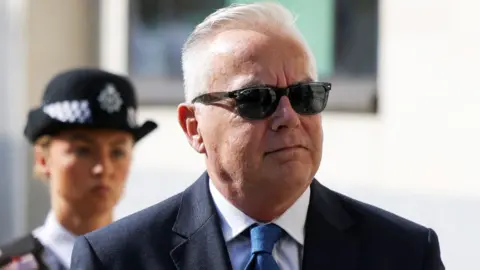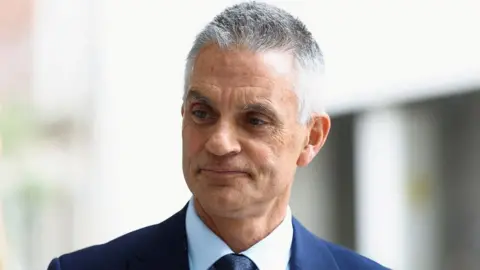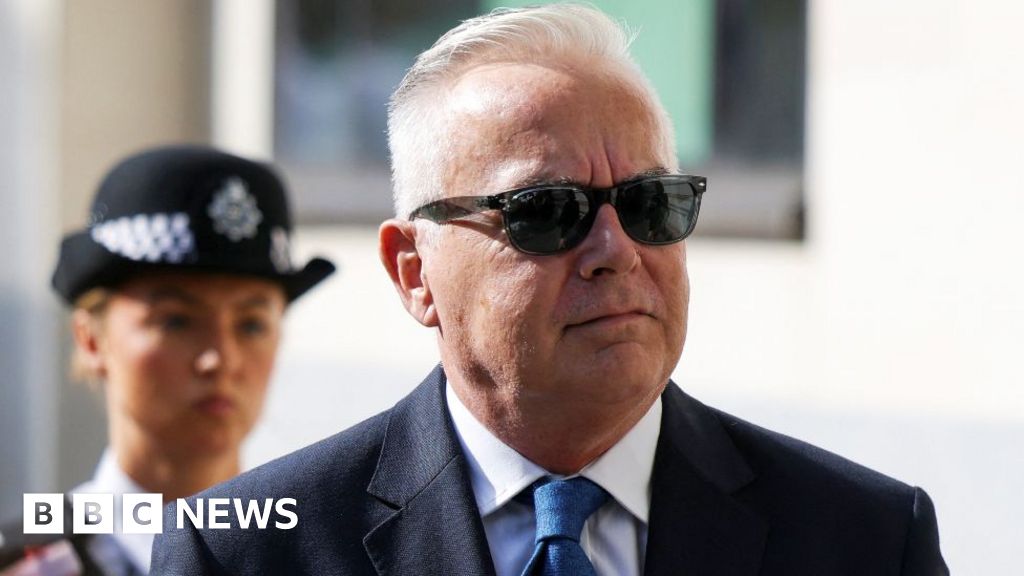 Reuters
ReutersThe BBC director general has defended the decision not to sack Huw Edwards, despite knowing that the presenter had been arrested in November over the most serious category of indecent images of children.
In an interview with BBC News on Thursday, Tim Davie said the corporation had taken “difficult decisions in a fair and judicious manner”.
Asked about how much BBC managers were told in November, he said: “We knew it was serious, we knew no specifics, apart from the category of the potential offences.”
BBC bosses were not aware of the ages of the children in the images.
Edwards, formerly the BBC’s most high-profile newsreader, pleaded guilty on Wednesday to three counts of making indecent images of children.
Although the BBC knew of the severity of the alleged offences, Mr Davie said the police had not told the corporation the details.
When the charges ultimately came to light earlier this week, Mr Davie said: “We were very shocked. No-one knew about the specifics of what we heard over the last few days, which have been deeply disturbing.”
He also reiterated that the BBC did not make Edwards’ arrest public at the request of the police, adding that the corporation also had to consider its duty of care to Edwards.
“When it comes to the decision we made in November, we were obviously faced with a difficult decision, and we considered it very carefully,” Mr Davie said.
“The police came to us and gave us information that they had arrested Mr Edwards. But they wanted to be assured of total confidence, and the reason they rung us at that point, it’s a technical process to ensure employees are protected and there’s no risk.”
He added: “Another factor at this point was very significant duty of care considerations. I think it was right for us to say we’d let the police do their business, and then when charges happen, we will act.”
 Reuters
ReutersAsked whether Edwards would still receive his pension, Mr Davie said it was “very difficult to claw back, nigh on impossible”, adding: “These are unfortunately the specifics of how it works.
“When it comes to pay, again, [it’s] legally challenging [to recover], but we’ll look at all options.”
Mr Davie was also challenged on the BBC’s own investigation into Edwards, which has not been published.
The director general said the BBC was “not sitting on anything that I think we need to share with the police, or is of a serious nature that would make me feel that we hadn’t followed up properly”.
He continued: “I can categorically say that when it comes to the offences we’ve seen, which are truly horrendous, any evidence that is out there is not in the hands of the BBC. If I saw evidence of that, that is not a complicated decision [to hand it over].”
On Wednesday, Edwards admitted having 41 indecent images of children, which had been sent to him by a convicted paedophile, Alex Williams, on WhatsApp.
They included seven category A images, the most serious classification – two of which showed a child aged between about seven and nine.
After being arrested last November, Edwards was charged in June. He had been off air since July 2023, when he was suspended after being named as the star at the centre of different allegations involving an explicit photo.
Earlier on Thursday, Prime Minister Keir Starmer said he was “shocked and appalled” by the charges against Edwards.
Asked whether any figures in BBC News knew about the charges before this week, Mr Davie confirmed CEO Deborah Turness was aware.
It was “a very small group of people at the centre” and “we had a very restricted list of names”, he said.
“When it comes to news, there was one name on it, the CEO of news, Deborah Turness. She isn’t involved editorially in the reporting of the story.”
Apart from Ms Turness, BBC News was not aware of the arrest nor charges against Edwards until they were made public on Monday. BBC News is editorially independent when reporting on the BBC.


